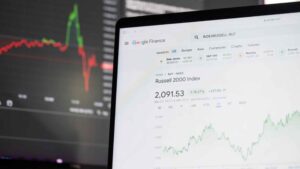The UK economy has faced a volatile day on July 2 as financial markets sold off government bonds which led to a decline in the British Pound and a rise in bond yields.
The sell-off came after Prime Minister Keir Starmer’s Labour Government removed plans to cut disability payments, raising fears of rising taxes and debt. The decision came in with Chancellor Rachel Reeves’ emotional appearance in the UK parliament, which led to doubts about the Labour party’s commitment to manage fiscal policy and economic stability.
Labour Party’s Turnaround on Welfare Reform
The Labour government, which was elected in July 2024, had a strong mandate to fix public finances. However, the government suddenly reversed its plan to cut £5 billion ($6.8 billion) in disability payments after a rebellion from its own lawmakers. ⁽¹⁾
The cuts aimed to reduce the number of people claiming benefits, both allowing the government to save money and encouraging people to work. Currently around 1 in 10 working age people in Britain are on such benefits, according to the Institute for Fiscal Studies. The government aimed to tighten eligibility to bring these numbers down, get more people back into work and save an estimated £5 billion. ⁽²⁾
But when the government released forecasts stating that the cuts to disability payments would push 150,000 people into poverty, its lawmakers rebelled. This factor caused the Labour government to struggle with its balance in the budget, with economists warning of a growing fiscal deficit. ⁽³⁾
Labour Government’s Struggles and Fiscal Policy
The Labour government was already facing doubts over its ability to fund its spending plans, as well as its commitment to self-imposed fiscal rules. Chancellor Reeves is facing a growing fiscal concern ahead of her autumn budget, fueled by the £5 billion reduction on Starmer’s flagship welfare reforms and the £1.25 billion reversal on giving winter fuel payments to pensioners. ⁽⁴⁾
Potential downgrades to Britain’s growth outlook from the Office for Budget Responsibility, the UK’s fiscal watchdog, also make for a fragile situation.
Those factors, combined with the slim £9.9 billion fiscal protection Reeves left herself at her spring economic update, have led economists to predict the chancellor is on course to hike taxes in the autumn, and could even relax her fiscal rules. ⁽⁵⁾
Chancellor Reeves’ Uncertain Future
Chancellor Reeves, who took office promising economic stability and strict fiscal policy, has faced intense criticism. After the government gutted its flagship welfare reform, Reeves walked into the parliamentary debating chamber for the weekly debating session of Prime Minister’s Questions looking puffy-eyed after Starmer refused to publicly endorse her staying on as chancellor. ⁽⁶⁾
Prime Minister Starmer’s initial hesitation fueled speculation about her potential exit. Some investors worry that a new chancellor might loosen Labour’s fiscal rules, allowing more borrowing and spending. The Prime Minister then assured the public that Rachel Reeves would remain Chancellor. ⁽⁷⁾
Market Reaction
As speculation of Reeves’ exit raced through markets, 30-year gilt yields surged 19 basis points on July 2nd, the biggest jump since April. The rise in gilt yields indicated how sensitive investors have become to news about UK fiscal policy. UK stocks slid, with the GBP dropping 1% as investors headed for the exits, skeptical of Starmer’s continued commitment to shoring up the nation’s precarious finances.
The selloff was almost like the UK’s market crisis in 2022, when Prime Minister Liz Truss was swept from power after her calamitous mini budget rattled the confidence of investors and sent borrowing costs soaring. ⁽⁸⁾
The British Pound rebounded the next day against the US dollar, following UK Prime Minister Keir Starmer’s assurances that Rachel Reeves will remain chancellor into the next election.



